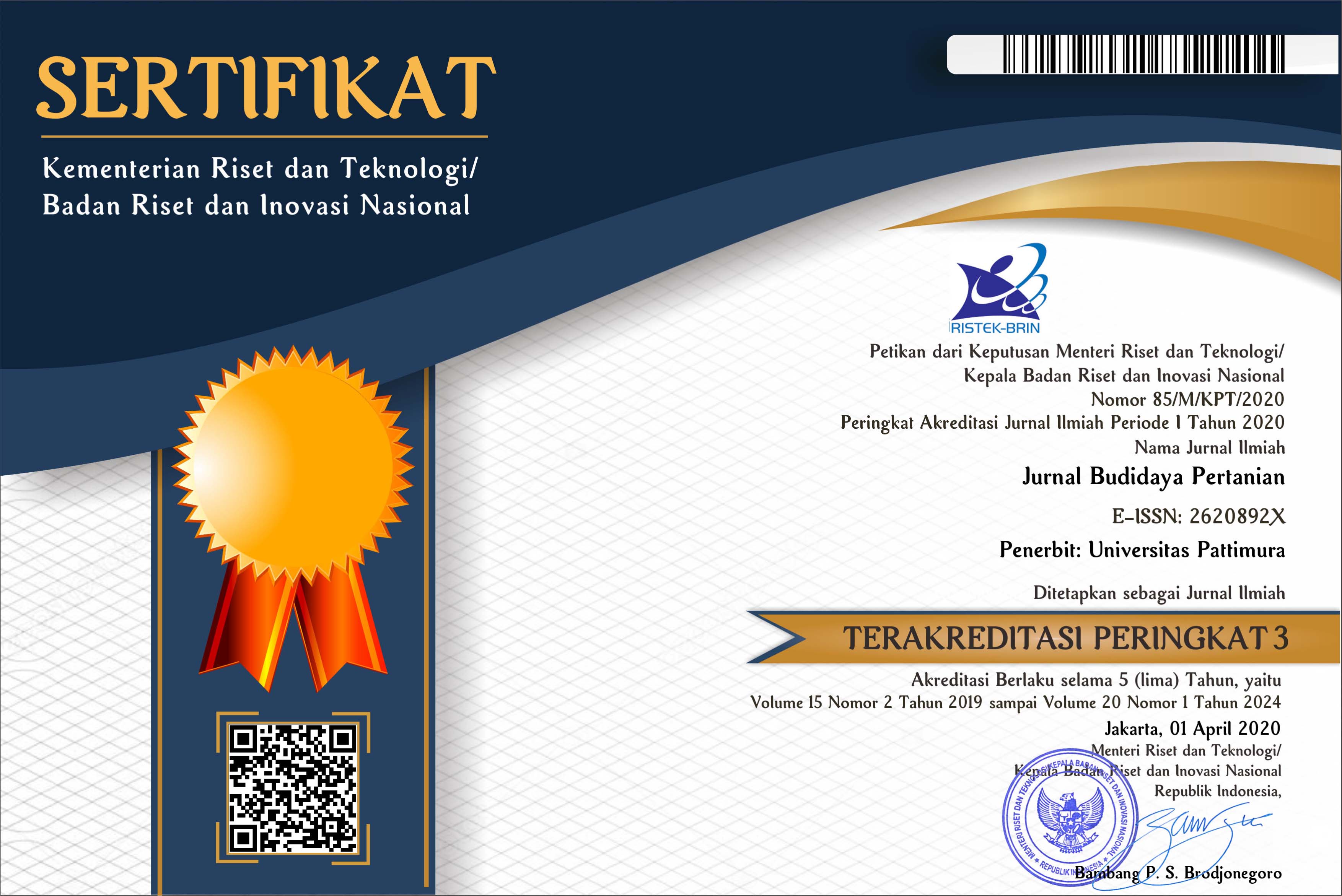Growth of Zamia Leaf Cuttings (Zamioculcas zamiifolia) with the Application of Auxin Hormone and Foliar Fertilizer on Water Media
Abstract
Zamioculcas zamiifolia is an ornamental aroid plant that can be propagated vegetatively through leaf, stem, and petiole cuttings. Cultivation efforts are needed to increase the viability of cuttings as well as faster root and shoot induction, one of which is by using planting media and adding ZPT. This study aims to determine the effect of the application of the hormone auxin and foliar fertilizer on the growth of zamia leaf cuttings in aqueous media. The research was carried out at the Stiper Agricultural Institute, Yogyakarta, from June 1 to August 10, 2021. The method used was a factorial experiment arranged in a completely randomized design (CRD). The first factor is the concentration of the auxin hormone which consists of 3 levels, namely 0; 2.5; and 5 ppm. The second factor is the concentration of foliar fertilizer consisting of 4 levels, namely 0; 0.25; 0.5; and 0.75 g/l. The results showed that the 0.25 ppm auxin treatment was able to induce root elongation. Foliar fertilizers have an important influence on root formation, keeping the cuttings green, tuber induction, shoot growth percentage, and the addition of fresh weight. The most optimal concentration of foliar fertilizer is 0.5 g/l.
Downloads
References
Abdel-Kadir, A.-R. H. (2022). Physiological study on the propagation of Zamioculcas zamiifolia by spraying with growth regulators and using different growing media. British Journal of Global Ecology and Sustainable Development, 08, 1–8. https://journalzone.org/index.php/bjgesd/article/view/92/85.
Anggraini, R., Selaras, G. H., & Fuadiyah, S. (2021). Comparison of the transpiration rate between begonia (Begonia sp.) and white jasmine (Jasminum sambac L.) using the water vapor collection method. Prosiding SEMNAS BIO 2021 Universitas Negeri Padang, 1, 673–678. https://doi.org/10.24036/prosemnasbio/vol1/86
Arimarsetiowati, R., & Ardiyani, F. (2012). Pengaruh penambahan auksin terhadap pertunasan dan perakaran kopi arabika perbanyakan somatik embriogenesis. Pelita Perkebunan, 28(2), 82–90. https://doi.org /10.22302/iccri.jur.pelitaperkebunan.v28i2.201
Chen, J., & Henny, R. J. (2003). Comprehensive crop reports ZZ: A unique tropical ornamental foliage plant origin and classification. Hortechnology, 3, 458–462. https://doi.org/10.21273/HORTTECH.13.3.0458
Efendi, E., Wahyudin Purba, D., Ul, N., & Nasution, H. (2017). Respon pemberian pupuk npk mutiara dan bokashi jerami padi terhadap pertumbuhan dan produksi tanaman bawang merah (Allium ascalonicum L). Jurnal Penelitian Pertanian Bernas, 13(3), 22-29.
Fanisia, I., & Sitawati. (2019). Pengaruh media perakaran dan konsentrasi zat pengatur tumbuh (ZPT) terhadap pertumbuhan stek daun tanaman sukulen Echeveria agavoides ‘Aquamarine’. Jurnal Produksi Tanaman, 7(9), 1669–1678. e-ISSN 2527-8452/ p-ISSN 2338-3976
Firmansyah, S. F., Rochmatino, R., & Kamsinah, K. (2014). Pengaruh pemberian IBA dan komposisi media terhadap pertumbuhan stek Sansevieria cylindrica var patula. Scripta Biologica, 1(2), 161. https://doi.org/10.20884/1.sb.2014.1.2.444
Gehlot, A., Gupta, R. K., Tripathi, A., Arya, I. D., & Arya, S. (2014). Vegetative propagation of Azadirachta indica: Effect of auxin and rooting media on adventitious root induction in mini-cuttings. Advances in Forestry Science, 1(1), 1-9. https://doi.org/10.14583/2318-7670.v02n04a10
Hastuti, W., Prihastanti, E., Haryanti, S., & Subagio, A. (2016). Pemberian kombinasi pupuk daun Gandasil D dengan pupuk nano-silika terhadap pertumbuhan bibit mangrove (Bruguiera gymnorrhiza). Jurnal Biologi, 5(2), 38–48.
Holtum, J. A. M., Winter, K., Weeks, M. A., & Sexton, T. R. (2007). Crassulacean acid metabolism in the ZZ plant, Zamioculcas zamiifolia (Araceae). American Journal of Botany, 94(10), 1670–1676. https://doi.org/10.3732/ajb.94.10.1670
Le Moullec, A., Juvik, O. J., & Fossen, T. (2015). First identification of natural products from the African medicinal plant Zamioculcas zamiifolia - A drought resistant survivor through millions of years. Fitoterapia, 106, 280–285. https://doi.org/10.1016/j.fitote.2015.09.011
Muharini, R., Masriani, M., & Rudiyansyah, R. (2018). Phytochemical screening, antioxidant, and cytotoxicity of Zamioculcas zamiifolia Root extract. Indonesian Journal of Pure and Applied Chemistry, 1(2), 62. https://doi.org/10.26418/indonesian.v1i2.30530
Opuni-Frimpong, E., Karnosky, D. F., Storer, A. J., & Cobbinah, J. R. (2008). Key roles of leaves, stockplant age, and auxin concentration in vegetative propagation of two African mahoganies: Khaya anthotheca Welw. and Khaya ivorensis A. Chev. New Forests, 36(2), 115–123. https://doi.org/10.1007/s11056-008-9087-6
Pourhassan, A., Kaviani, B., Kulus, D., Miler, N., & Negahdar, N. (2023). A complete micropropagation protocol for black-leaved Zamioculcas zamiifolia (Lodd.) Engl. ‘Dowon.’ Horticulturae, 9(4). https://doi.org/10.3390/horticulturae9040422
Rosman, R., Soemono, S., & Suhendra. (2004). Pengaruh konsentrasi dan frekwensi pemberian pupuk daun terhadap pertumbuhan panili di pembibitan. Bul Littro, 15(2), 22-31. https://repository.pertanian.go.id/handle/123456789/3947
Siregar, R., & Siahaan, L. (2021). Campuran media dan hormon tumbuh pada stek daun tanaman hias indoor Zamio curcas (Zamioculcas zamiifolia). Tapanuli Journals, 3(2), 309–322. https://doi.org/10.2201/unita.v3i2.271
Sriprapat, W., & Thiravetyan, P. (2013). Phytoremediation of BTEX from indoor air by Zamioculcas zamiifolia. Water, Air, and Soil Pollution, 224(3). https://doi.org/10.1007/s11270-013-1482-8
Sulaksono, B., & Prasetyo, E. (2020). Filterisasi air kran/air sumur langsung minum. Jurnal Ilmiah Program Studi Magister Teknik Mesin, 10(1), 19-26. https://doi.org/10.35814/teknobiz.v10i1.1357
Sulistiana, S. (2013). Respon pertumbuhan stek daun lidah mertua (Sansevieria parva) pada pemberian zat pengatur tumbuh sintetik (Rootone-F) dan asal bahan stek. Jurnal Matematika, Sains, dan Teknologi, 14(2), 107-118.
Sylviana, R. D., Kristanto, B. A., & Purbajanti, E. D. (2019). Respon umur fisiologi bahan stek mawar (Rosa sp.) pada pemberian konsentrasi indole-3-butyric acid (IBA) yang berbeda. Buletin Anatomi dan Fisiologi, 4(2), 168–174. https://doi.org/10.14710/baf.4.2.2019.168-174
Taiz, L., & Eduardo, Z. (2003). Plant Physiology. Third Edition. Sinauer Associates. UK. ISBN: 10. 0878938230.
Tchoundjeu, Z., Avana, M. L., Leakey, R. R. B., Simons, A. J., Asaah, E., Duguma, B., & Bell, J. M. (2002). Vegetative propagation of Prunus africana: effects of rooting medium, auxin concentrations and leaf area. Agroforestry Systems, 54, 183–192.
Winarto. (2007). Respons pembentukan tunas aksiler dan adventif pada kultur anthurium secara in vitro. J.Hort., 17(1), 17-25. https://doi.org/10.21082/jhort.v17n1.2007.p%p
Copyright (c) 2023 tantri swandari, Rohmat Maulana Ibrahim, Sri Suryanti

This work is licensed under a Creative Commons Attribution-ShareAlike 4.0 International License.

 Accreditation is valid for 5 years, starting from Volume 15 Issues 2 December 2019 up to Volume 20 Issue 1 June 2024.
Accreditation is valid for 5 years, starting from Volume 15 Issues 2 December 2019 up to Volume 20 Issue 1 June 2024.






